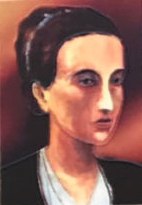Vicenta Moguel facts for kids
Quick facts for kids
Vicenta Moguel, Bizenta Mogel
|
|
|---|---|
 |
|
| Born | 1782 Azcoitia, Spain
|
| Died | 1854 Abanto, Spain
|
| Other names | Bizenta Mogel Elgezabal |
| Occupation | Writer and Translator |
Vicenta Moguel Elgezabal (born in Azkoitia, 1782 – died in Abanto, 1854) was a Spanish writer and translator. She was the first woman to write books in the Basque language. In the Basque Country, people often call her Bizenta Mogel Elgezabal.
Contents
Her Early Life and Learning
Vicenta Moguel was born in 1782 in Azkoitia. This town is in the northern part of Spain, in a region called the Basque Country. When she was very young, her father passed away. She then moved with her brother, Juan José, to live in Markina. They lived with their uncle, Juan Antonio Moguel. He was a priest and a famous writer.
Her uncle was a very smart person. He wrote the first novel in the Basque language, called Peru Abarca. He was also friends with Felix Maria de Samaniego, who was known for his fables. Vicenta's uncle taught her many things. He taught her Latin, Basque, and Spanish. He also helped her love reading and writing, especially fables. Her brother, Juan José, also grew up to be a talented writer.
Her Career as a Writer
Vicenta Moguel became a teacher in the Society of Friends of the Country. She is famous for being the first woman to write in the Basque language. This was a time when most women did not learn to read or write. She even had to explain why she was a woman who could read and write.
Her Most Famous Book: Ipui onak
Vicenta's first and most well-known book is Ipui onak (which means The Good Stories). She wrote it in 1804 when she was 22 years old. This book is her translation of Aesop's fables into prose. It includes 50 fables from Aesop. She also added eight fables written in verse by her uncle, Juan Antonio.
Before her uncle's fables, there is another text called Adigarria. At the end of the book, there is a lexicon, which is like a small dictionary. It has two parts: one for Vicenta's fables and one for her uncle's. When Ipui onak was published, many people liked it. It was printed again several times.
Other Works and Translations
Vicenta also wrote Gabonetaco cantia Bizkaitar guztientzat (Christmas Song for all Biscay) in 1819. One of her songs was even put into a collection by a writer named Mahn. In 1820, she translated an important letter from the main leader of the church in Spain into Basque. This translation was published in Bilbao. She also helped check and correct texts written by Jose Pablo Ulibarri.
Besides her published fables, she wrote other pieces too. These include a special dedication to Don Victor Munibe and Aranguren. She also wrote the introduction for a Basque reader. Some of her fables were included in a songbook called Cancionero in 1880. They also appeared in newspapers and magazines of her time.
Why Fables Were Important
During Vicenta's time, fables became very popular again. This happened as traditional stories from the Catholic Church became less influential. People started to think that fables, which always teach a moral lesson, were the best things for children to read. Vicenta herself talked about the importance of morals in her introduction. She wrote:
- "When I was a child I listened to the folk tales marveling and crazy with joy."
- "And I believed the ridiculous and insubstantial tales of Peru and Maria as if they were great truths."
- "So, if those stupid tales without any teaching gave me such satisfaction before reaching the age of reason, how much more would my heart be softened when I later read the good stories?"
Her Personal Life
Vicenta Moguel married a man named Eugenio Basozabal. She passed away in Abanto, Spain, in 1854. She was 72 years old.
Awards and Honors
On March 8, 2017, a library in Durango, Spain, was named after her. It is called the Bizenta Mogel Elgezabal Municipal Library. The city council of Durango decided to do this. They wanted to make women more visible in public places. Even though Vicenta had not lived in Durango, she was honored there. She was recognized as the first woman to write and publish in the Basque language.
See also

 | Georgia Louise Harris Brown |
 | Julian Abele |
 | Norma Merrick Sklarek |
 | William Sidney Pittman |

